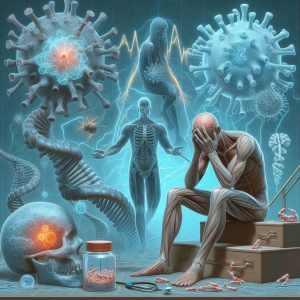The project at a glance
-
Start date:01 Apr 2022
-
Duration in months:48
-
Funding:Institute for Advanced Studies (IAS) / University of Luxembourg
-
Principal Investigator(s):André SCHULZ
About
Shared Underlying Mechanisms of Long-COvid and Chronic Fatigue Syndrome – A psychoneuroendocrinological and psychoimmunological perspective (SUMCO) – funded by the Institute for Advanced Studies, University of Luxembourg. At least 10 % of patients recovering from Covid-19 develop persistent health consequences such as fatigue, myalgia, or post-exertional malaise. “Long-Covid” is one of the many terms used to describe the occurrence of respiratory, cardiovascular, neurological, and/or gastrointestinal symptoms weeks after the initial infection is resolved. Although some symptoms seem to be unique to Long-Covid (e.g., olfactory & gustatory dysfunction), there is a large symptom overlap with the condition of myalgic encephalomyelitis/chronic fatigue syndrome (ME/CFS). ME/CFS is a complex, multisystem condition affecting 0.89 % of the global population. Different factors have been hypothesized to be involved in the aetiology of ME/CFS, including immune system dysregulation, metabolic alteration, autonomic nervous system (ANS) and limbic system dysfunction, as well as abnormalities in the hypothalamic-pituitary-adrenal (HPA) axis. One popular hypothesis postulates that ME/CFS is a post-infectious fatigue syndrome, as up to 50 % of ME/CFS cases develop after a viral infection (e.g., infection with Epstein-Barr Virus/EBV). This observation raises the question if Long-Covid and ME/CFS share similarities in underlying pathophysiology, as both conditions seem to occur after viral infections (SARS-CoV-2 & EBV), which trigger dysregulations in the immune system, the ANS, or the HPA axis. A proper characterization of Long-Covid and ME/CFS by a thorough, interdisciplinary psychological and physiological assessment may help to make a differential diagnostic distinction of the two patient groups. The aims of the current project are: (1) To reveal similarities and differences in the pathophysiology of Long-Covid and ME/CFS, as an in-depth understanding of the underlying psychobiology is essential to design adequate prevention in terms of early detection of pathological biomarkers and treatment interventions for Long-Covid syndromes and ME/CFS in terms of a graded exercise therapy. We specifically focus on potential alterations in the immune system, the ANS, and the HPA axis. (2) We aim to elucidate how these processes translate into severity of fatigue, as the relationship between these alterations and actual symptom distress remains yet unclear. Ultimately, as biological and psychological markers of Long-Covid and ME/CFS can help to monitor the course of symptoms and the potential responsiveness to treatment intervention, we aim (3) at investigating the effectiveness of a graded exercise therapy on symptom severity and potential improvement in alterations of the immune system, the ANS and the HPA axis.
Organisation and Partners
- Brain-Body Interaction
- Department of Behavioural and Cognitive Sciences
- Faculty of Humanities, Education and Social Sciences (FHSE)
- Health and Behaviour
Project team
-
André SCHULZ
-
Marc SCHLESSER
-
Jochen SCHNEIDER
-
Nina BUNTIC
Keywords
- Interoception
- Stress
- Symptoms
- Chronic fatigue syndrome
- Long-covid
- Post-covid
- Autonomic nervous system
- HPA axis
- Immune system
